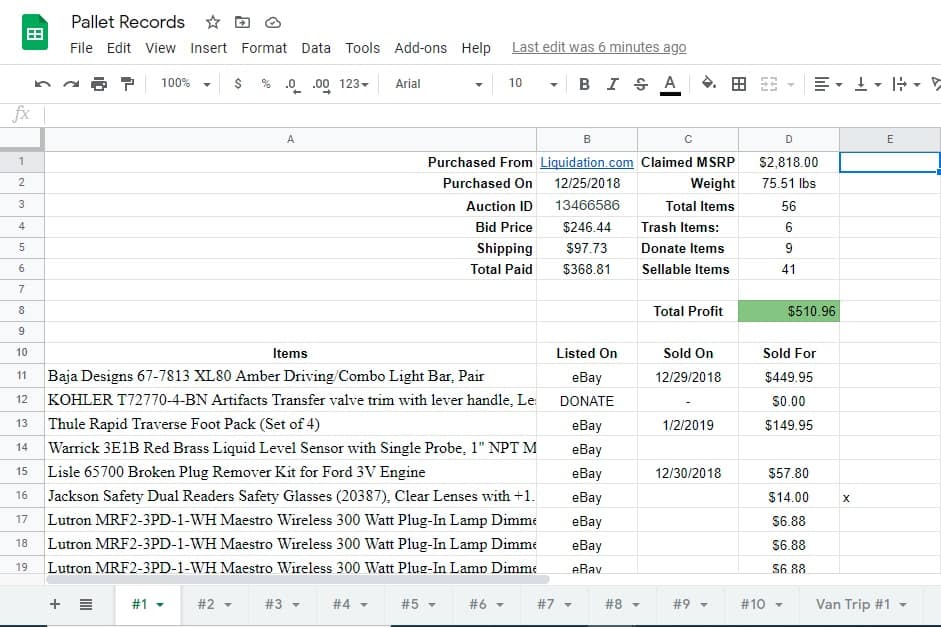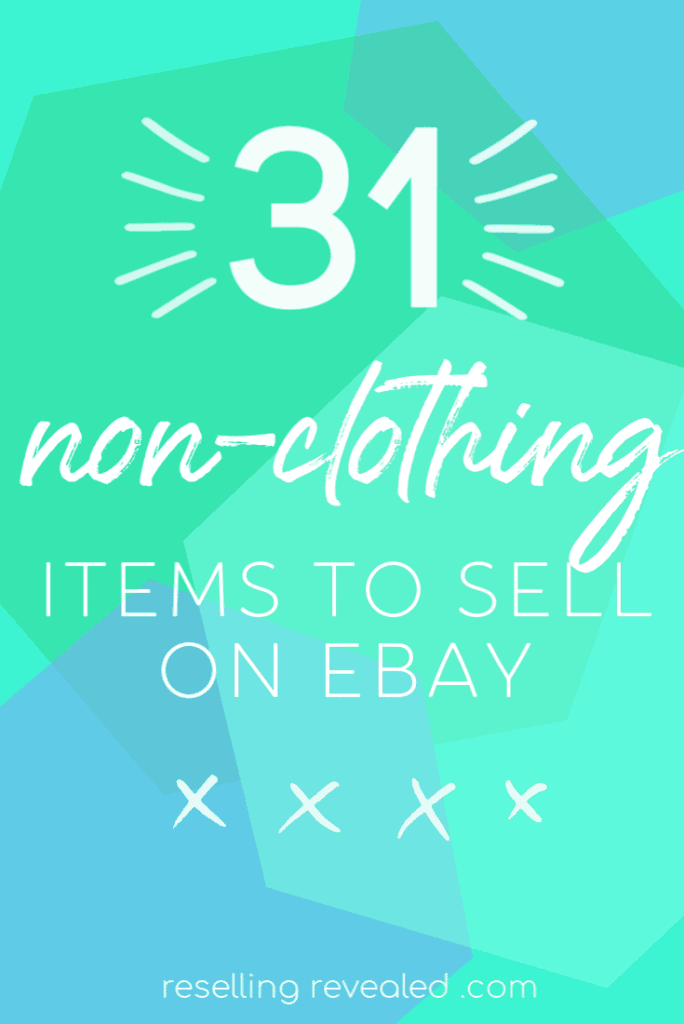As an Amazon Associate I earn from qualifying purchases.
Every reseller hits the point where they know that digging through rack after rack in thrift stores just isn’t going to cut it. For some people, it’s because they’re just sick and tired of thrift stores. For others, it’s because they realize that they can never find enough inventory to make the kind of money they want to make.
At that point, you have a couple of different options. You can just accept that your reselling business will never be super profitable, you can quit, or you can change your methods in a way that will allow you to scale your business. Which leads most people to the same question: how can I get massive amounts of inventory with less of a time investment?
The answer, of course, is to buy items in bulk. Unless you want to set up wholesale accounts and pivot your business into selling new items, you probably started looking at buying customer returns and other types of liquidation. Personally, I suffer from thrift store burnout in waves but the real reason I wanted to buy liquidation pallets was to grow a massive eBay store that would be more than a basic full-time income.
For most people, liquidation.com is one of the first sites they come across when looking for inventory in bulk or the ever-popular (and overpriced) “pallets of Amazon returns.” One of the main reasons for this is because Liquidation.com advertises aggressively, not to mention the fact that they are one of the biggest companies in the space, having done over 8 billion dollars in sales with over 3.6 million buyers.
However, Liquidation.com has a less than stellar reputation in most online communities and reseller circles. Despite having heard dozens of horror stories about the platform we continue to buy from liquidation.com regularly. So with that in mind, I figured I’d share with you the reality of buying not only from liquidation.com but from liquidation sites in general. If you don’t know what you’re doing, you’ll likely lose all the money you invest and become one of the bitter people leaving them a nasty review on ConsumerAffairs.
How Does Liquidation.com Work?
If you sell on eBay or Poshmark it should be easy to understand how liquidaiton.com works. They simply do the same thing as the platforms you know but at a much higher level. They provide a platform where sellers and stores can list items for sale in bulk. Typically these items are lots ranging in size from a box of products to a truckload.
Just like eBay or Poshmark, Liquidation.com charges a percentage fee to sell something on their service. In addition to providing a platform, however, they also provide warehouses where they store and ship the merchandise as well as handle all payments.
It’s important to remember that it’s not Liquidation.com selling the lots you bid on. Just as it’s not 100% eBay’s fault if you deal with a crappy seller on their platform it’s not Liqudation.com’s fault if the lot you buy ends up being garbage. And it happens.
It’s also worth noting that most of the auctions on Liquidation.com are not actually from stores or manufacturers. They are listing from other resellers who buy direct from the stores and then resell to you. In some instances, you might be 2-3 middlemen away from the primary source of the product. With every middleman, the products get cherrypicked (eg. they get crappier) and they get a bit more expensive.
As an example, Amazon does not sell pallets of returns directly on Liquidaiton.com, despite the staggering number of Amazon returns available there. There are high-level resellers who buy truckloads (or several truckloads) of products from Amazon and then break them up into smaller lots to sell to you and me (often after pulling some of the best/easiest to resell items).
Why Buy From Liquidation.com?
The main reason to buy from liquidation.com is simply to get your feet wet in the bulk-buying industry. It’s not the most profitable platform. However, until you have the experience to feel confident spending tens of thousands of dollars on truckloads of product, it’s probably your best bet.
The other reason to buy from them is that, despite their reputation, they are a large and legitimate company that provides some level of professionalism and protection for buyers. Can you get scammed? Yes, but it’s less likely than on sketchier platforms and far less likely if you are aware of what you’re doing.
My Experiences on Liquidation.com
In the past two years, I’ve spent over $5,000 (not including shipping) on liquidation.com and purchased around 30 lots of every type imaginable. It should be fairly obvious that they are not our only source of inventory. We use other bulk sources and still thrift regularly.
During that time, I have had 3 orders that were absolute trash. They were all items that were sold as “customer returns” but everything inside was smashed or otherwise unusable. I ended up selling the best items for parts and sending the rest to the dump as it wasn’t even worth donating. I didn’t quite make my money back. Apart from those orders, however, I have profited on every lot I’ve bought.
For the first 10 lots, I bought I kept absolutely meticulous records. Most eBay sellers have absolutely no idea how much money they actually make and I firmly believe most make way less than they think. Here’s an idea of what the first lot I bought looked like:

Most people claim that “the best you can do is double your money” on liquidation and it’s close to the truth. While we have had some boxes that were gold mines, we haven’t made 10x our money like you can at a thrift store. Our average return has been somewhere before 2-3x.
Even in the best lots, you can expect to find a significant amount of things that are broken, missing parts, or not worth selling for other reasons. On average, we end up donating or throwing away between 10-30% of each lot. The rest is typically sellable in some form or another.
I guess the most telling aspect of my experience is that I’ve continued to buy from their platform. I’ve learned a couple of good sellers that I trust and simply stick to their auctions, no matter how shiny something else looks.
So if I were to give a liquidation.com review in a couple of sentences it would go something like this:
Liquidation.com is a legitimate platform for buying returns, shelf pulls, and salvage items. Once you gain some experience on the platform it is possible to consistently make 2-3x your money flipping items you buy.
Not exactly glowing, is it? Well, that about sums up my experience.
What Does Liquidation.com Have Such Bad Reviews?
When I first contemplated buying large lots, I read all of the liquidation.com reviews I could find. In general, the angry and critical reviews could be summed up with one sentence:
People were shocked and angry at the quality of the products they received.
The problem here is two-fold. Yes, sometimes when you buy liquidation lots (from any site) you will get screwed. That is part of the game. This is the reason why you should never spend money that you can’t afford to lose on returns or liquidation. Yes, it does suck to spend a ton of time breaking down a pallet and selling it to simply recoup your investment. But sometimes you win big as well.
Now the other part of the issue is the part I think is the “real” issue: people think they’ve discovered a gold mine and bid big on an auction. They assume the best about the product and are severely let down to find out they overpaid.
If you think you’re going to get a lot of perfectly working electronics and sell them for 80% of the claimed MSRP you’re going to be a very sad reseller. Remember, things are being liquidated for a reason. If there was abundant easy money in it, it wouldn’t be liquidated or margins would be even thinner. Expect the absolute worst in a lot and you’ll usually be mildly happy with it.
Things to Keep in Mind When Buying From Liquidation.com – 11 Tips
I had a bunch of thoughts and tips for buying on liquidation.com that I couldn’t quite fit into the article. Because I think they’re important I just decided to list them here for you:
- Do not buy electronics from electronics companies. This should be self-evident but many of the angry reviews I see are from people who buy things like iPhones and find out that they’re all trash. Think for a second, if they were any good, the company would have sold them themselves like they do all the other working phones. This applies to pretty much every “refurbished” item on the site as well as many of them are items that the sellers tried and failed to fix.
- You will get screwed on shipping. Liquidation.com makes money on shipping so don’t expect to pay a fair price.
- You’re bidding against people who can pick up auctions. We typically buy lots that are located in Las Vegas as that the closest center to us (meaning the cheapest shipping). However, we have thin margins because most people bidding on those lots plan to pick them up in person and don’t have to factor shipping into their costs. We actually bought a 15 passenger van and drove the 13 hours roundtrip to Vegas to pick up a ground of 6 lots and came out money ahead.
- Don’t spend money you can’t afford to lose. With every lot you buy, it’s totally possible that you get hosed. Buying liquidation pallets takes capital so, if you’re short on funds, stick to thrifting and the Goodwill Outlet until you have some cash reserves and could take a loss.
- The bigger the lots, the better the deal. The more money you’re willing to invest, the better chance you have of getting a deal. The farther up the money food-chain you go the fewers buyers you’ll find.
- Don’t buy a pallet or lot based on a single item. Often times you’ll find lots of trash that have one or two good items in them. Typically, the seller has added an item to sweeten the deal and get some boxes of crap out of their warehouse. The chances of that one item being defective are as good as any other so don’t bid. Look for auctions where, even if the top items were trash, you could still come out ahead.
- Electronics are the most overpriced area. In fact, I rarely buy electronics. They often go for up to 30% of MSRP (or more) leaving very little room for profit. Unless you have the expertise to fix broken electronics yourself to try and coax every last dollar out of a lot I’d pass.
- Distrust the MSRP and study the manifests. Before bidding on my first lots I looked up almost every single item on the manifest to see what I could actually sell it for. Some things sell for more than they state, nearly everything sells for less. It’s not uncommon to find a lot of clothing with an MSRP of $4,000 only to find out that all of the clothing in it already failed to sell on clearance at Nordstrom Rack for 90% off of retail.
- Companies misrepresent their products. While this is less true of the high volume sellers (such as the ones I linked above) most small sellers will be deceptive or outright lie to you about what they’re selling. For example, you might find a title that says something like “iPad Pro 128GB (Quantity: 30)” but when you look at the manifest you find out that you’re getting only one iPad Pro and 29 first-generation 16GB iPads. Do your due diligence.
- Everything is sold “as is”. Liquidaiton.com does have a dispute system but it’s not very user-friendly. You are limited by some very specific requirements and time windows. I’ve never bothered filing a dispute. It’s easier for me to chalk it up to a learning experience and move on, knowing that it’ll lower my tax bill at the end of the year.
- Avoid lots with a high MSRP but a low individual item value. You will find lots on liquidation.com that have an MSRP of over $2,000 but contain several hundred items. Of the working ones, you’ll be lucky to sell them for 50-75% of retail, meaning $10 a pop. If high volume low dollar sales fit with your business model, go for it. They don’t fit with mine.
Final Liquidation.com Review and Thoughts
Perhaps the best thing that Liquidaiton.com has done is provide a platform that is accessible to resellers who just want to get their feet wet buying pallets and returns. If you can’t afford to buy items by the truck-load, it can be a great place to get some experience and make some money.
As long as you have tempered your expectations and go about things in an intelligent way, you don’t have to worry about losing the farm.
Other Places To Buy Liquidation Pallets
If liquidation.com isn’t a great fit for you, there are several other reputable sellers that work with stores to liquidate their returns and overstock. I have not used all of these so do some research before jumping in!
Whichever liquidation company you choose to buy from, be smart, have fun, and may the odds always be in your financial favor!





Your assumptions about the complaints of Liquidaton.com are that, assumptions and incorrect. I very recently purchased at retail value of $15K lot from them. I received the shipment, the quality was good, so I was pleased, until I actually compared the manifest to what was received. Significant differences. About 5K in missing product that was on the manifest, and not with the shipment. But when you looked at the pics of the shipment, the items were missing in the pictures ( as many were large enough to be easily visible). So the items missing were never on the pallets to be shipped. This is not an accident, it is a concerted effort to deceive. If you aggregate many of the reviews, there is a pattern of deception. I have reported the case to their disputes department and its been a week to get any updates, but I am not optimistic for any resolution. Even if a resolution is offered, I have spent hours preparing my dispute calculating weights and detailing what is missing. I won’t get that time back. So the bottom line…don’t buy from them.
I just found out Liquidation.com sells directly to consumers on eBay under seller name NextHomeDesign “nexthomedesign”. Truly horrible to find out your supplier is your biggest competitor.
In addition, they are allowed to use manufacturer’s photos without any VeRO violations. I’m glad I figured this out before investing $100k’s in an online B2C liquidation company using products bought from Liquidation Services, LLC, aka Liquidation.com.
I thought “nexthomedesign” must have been laundering money. Nope. Dipping from the honey pot in two ways.
You can’t complete… you might as well buy their items on eBay and resell those rather than take chances on pallet lots.